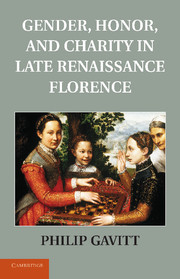Book contents
- Frontmatter
- Contents
- Acknowledgments
- Introduction
- 1 Charity, Discipline, and State-Building in Cinquecento Florence
- 2 Gender, Lineage Ideology, and the Development of A Status Culture
- 3 Law And the Majesty of Practice
- 4 Innocence and Danger: Pedagogy, Discipline, and the Culture of Masculinity
- 5 From Putte to Puttane: Female Foundlings and Charitable Institutions in Florence
- 6 Unruly Nuns: Clausura And Confinement
- Conclusion: The Honor of God, of the City, and of Their Own Houses
- Bibliography
- Index
- References
6 - Unruly Nuns: Clausura And Confinement
Published online by Cambridge University Press: 07 September 2011
- Frontmatter
- Contents
- Acknowledgments
- Introduction
- 1 Charity, Discipline, and State-Building in Cinquecento Florence
- 2 Gender, Lineage Ideology, and the Development of A Status Culture
- 3 Law And the Majesty of Practice
- 4 Innocence and Danger: Pedagogy, Discipline, and the Culture of Masculinity
- 5 From Putte to Puttane: Female Foundlings and Charitable Institutions in Florence
- 6 Unruly Nuns: Clausura And Confinement
- Conclusion: The Honor of God, of the City, and of Their Own Houses
- Bibliography
- Index
- References
Summary
If the previous chapters have suggested several explanations for the proliferation of institutions to house unmarried women during the sixteenth century, so far the argument has cited legal obstacles for women, obstacles tied to the transmission of property, and the tendency on the part of those families under Florentine jurisdiction to interpret laws concerning patrilineality with special harshness relative to other areas of Italy. In Venice, for example, women were much freer to dispose of property and thus enjoyed an enviable autonomy with respect to their Florentine counterparts. Yet the problems of conventual discipline and overpopulation, as well as the strains on states’ efforts to regulate and confine unmarried women, afflicted Venice and her territories, as well as Milan, Bologna, and Genoa. Thus, to move the problem into a broader geographic context also requires the admission, ultimately, that specific problems with Florentine legal custom and inheritance practice must have been overshadowed by problems common to women and families across northern Italy.
- Type
- Chapter
- Information
- Gender, Honor, and Charity in Late Renaissance Florence , pp. 196 - 227Publisher: Cambridge University PressPrint publication year: 2011



